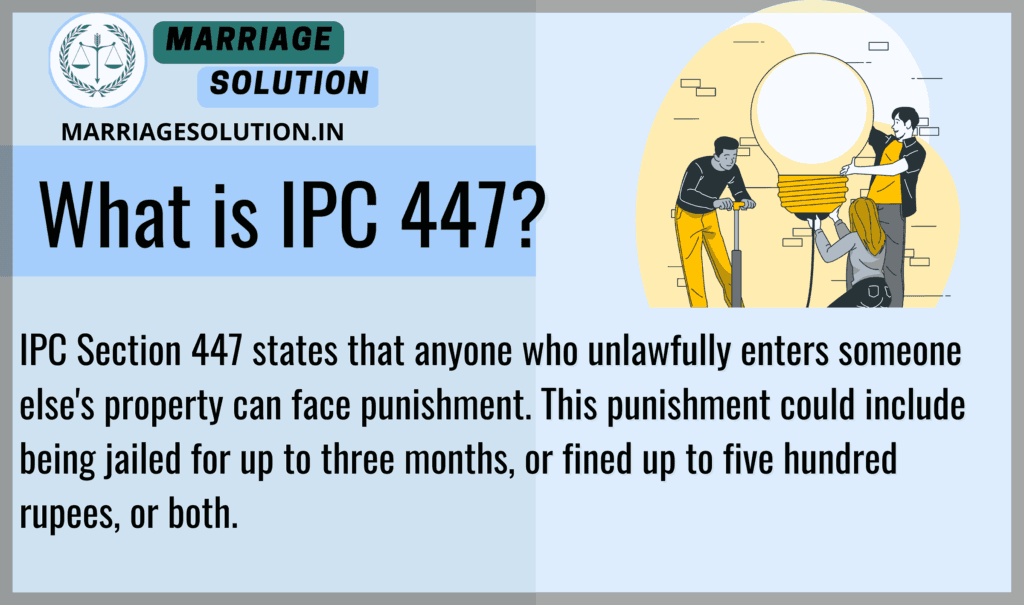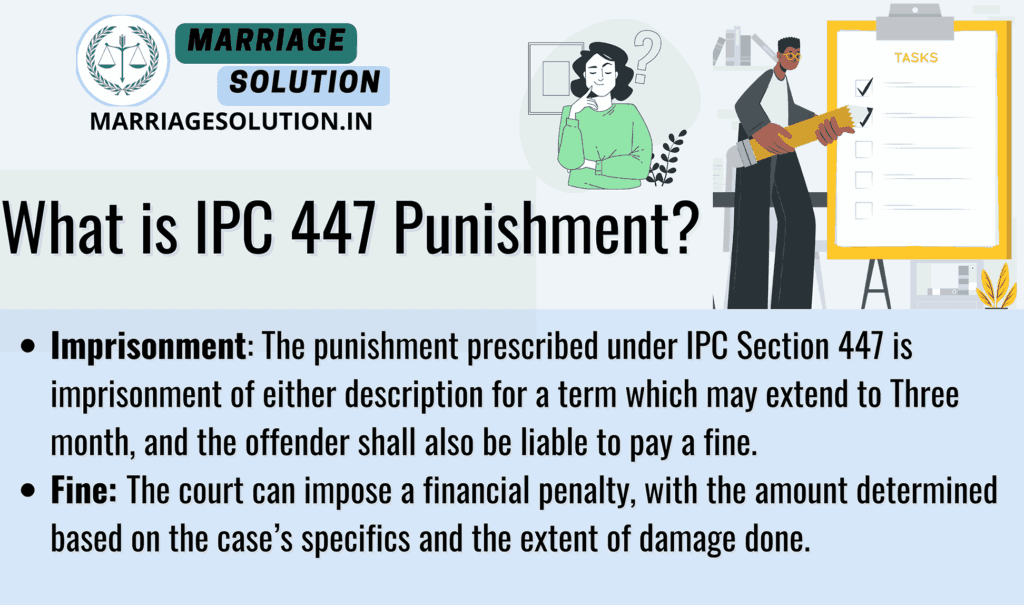Introduction of IPC Section 447
IPC Section 447 addresses criminal trespass, involving unauthorized entry onto property with potential force or violence, posing a risk of injury or causing fear to the property owner. The punishment may include imprisonment up to three months, a fine up to five hundred rupees, or both.
- Introduction of IPC Section 447
- What is IPC Section 447 ?
- IPC Section 447 Overview
- IPC 447 Punishment
- 447 IPC bailable or non bailable ?
- Section 447 IPC in short information
- IPC Section 447 FAQs
- If you need support with court proceedings or any other legal matters, don’t hesitate to reach out for assistance.
What is IPC Section 447 ?
IPC Section 447 states that anyone who unlawfully enters someone else’s property can face punishment. This punishment could include being jailed for up to three months, or fined up to five hundred rupees, or both.

IPC Section 447 Overview
IPC Section 447 addresses criminal trespass, involving unauthorized entry onto property with potential force or violence, posing a risk of injury or causing fear to the property owner. The punishment may include imprisonment up to three months, a fine up to five hundred rupees, or both.
Criminal Trespass: Criminal trespass refers to unlawfully entering or remaining on someone else’s property without permission. This offense is defined under Section 441 of the Indian Penal Code (IPC). Section 447 deals specifically with criminal trespass under aggravated circumstances.
Use of Force or Violence: In cases of criminal trespass under IPC Section 447, the trespasser may use force or violence to gain access to the property or to remain on it. This could involve breaking locks, doors, or other barriers to enter the premises.
Likelihood of Injury: The actions of the trespasser may pose a risk of injury to any person present on the property. This could be intentional, such as threatening behavior, or unintentional, such as creating hazardous conditions that could lead to harm.
Causing Fear or Annoyance: The trespass might also cause fear or annoyance to the person who owns or is in lawful possession of the property. This could include verbal threats, intimidating behavior, or simply invading the privacy of the property owner.
Protection of Property Rights: Section 447 of the IPC aims to protect the rights of property owners and occupants by discouraging unauthorized entry and occupation. It reinforces the principle that individuals have the right to control access to their property.
Punishment: The punishment for criminal trespass under IPC Section 447 can include imprisonment for up to three months, a fine of up to five hundred rupees, or both. The severity of the punishment may depend on the nature and circumstances of the trespass.
IPC 447 Punishment
- Punishment under IPC 447:
- If found guilty under IPC Section 423, the punishment can include imprisonment for up to three years, or a fine, or both.
- Fine for IPC 447:
- The court may impose a monetary penalty up tp 500 rs as part of the punishment for an offense under IPC Section 447.

447 IPC bailable or non bailable ?
IPC Section 447 offenses are generally considered bailable, meaning the accused can seek bail, subject to the discretion of the court and certain conditions.
Section 447 IPC in short information
| Aspect | Details |
|---|---|
| Offense | Criminal Trespass |
| Definition | Entering or remaining on another person’s property unlawfully, with use of force or violence |
| likely to cause injury, or causing fear or annoyance to the occupant | |
| Punishment | Imprisonment of either description for up to three months, or a fine of up to five hundred rupees |
| Bailable/Non-Bailable | Bailable |
IPC Section 447 FAQs
What does IPC Section 447 cover?
IPC Section 447 deals with the offense of criminal trespass. It involves unlawfully entering or remaining on someone else’s property without permission.
What constitutes criminal trespass under IPC Section 447?
Criminal trespass occurs when someone enters another person’s property without lawful authority or uses force, violence, or threat to gain entry or stay on the premises.
Can criminal trespass involve causing fear to a person?
Yes, if during the trespassing act, the offender’s actions cause fear or intimidation to a person lawfully present on the property, it can be considered an aggravating factor.
If you need support with court proceedings or any other legal matters, don’t hesitate to reach out for assistance.
Court or any other marriage-related issues, our https://marriagesolution.in/lawyer-help-1/ website may prove helpful. By completing our enquiry form and submitting it online, we can provide customized guidance to navigate through the process effectively. Don’t hesitate to contact us for personalized solutions; we are here to assist you whenever necessary!
